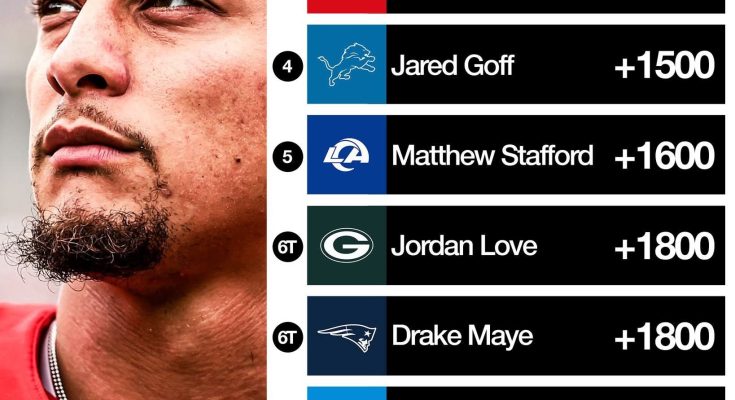The NFL MVP race is one of the most compelling subplots of every season, and this year, it’s once again swirling around a familiar name—Patrick Mahomes. The Kansas City Chiefs quarterback, already a two-time MVP and two-time Super Bowl champion, is currently the favorite to win the award once again, as he tries to secure his third piece of hardware. But even with all the accolades, the statistics, the brilliance on the field, and the current betting odds in his favor, the idea that Mahomes is a “lock” for the 2025 NFL MVP deserves a closer, more skeptical look.
At first glance, it makes total sense. Mahomes is operating at a level few quarterbacks ever reach. His vision, creativity, leadership, and consistency are virtually unmatched in today’s NFL. Through the first six weeks of the 2025 season, he’s compiled over 1,500 passing yards, 11 touchdowns, and has managed to keep the Chiefs in the hunt for the AFC’s top seed even with injuries across the offense. With Rashee Rice sidelined, inconsistent production from his receiving corps, and an offensive line that has been up and down, Mahomes has still managed to make the Chiefs look like contenders. That, in itself, speaks volumes. When most quarterbacks lose their top weapons or deal with shaky protection, their play crumbles. Mahomes, on the other hand, seems to thrive under adversity.
This plays directly into one of the most powerful undercurrents in MVP voting—narrative. The MVP isn’t purely a statistical award; it’s an award that tells a story. And voters love a good story. Mahomes’ story in 2025, if it continues to unfold this way, could be framed as a tale of resilience, excellence, and leadership amid chaos. Voters would see a quarterback who not only maintained his elite performance, but elevated his team despite a revolving door of receivers, a less-than-elite defense, and the pressure that comes with being the face of the league.
Statistically, Mahomes has always been a top-tier performer. But his raw stats this season, while impressive, aren’t necessarily jaw-dropping. He’s not far ahead of the pack in touchdowns or yards. However, he’s maintained an efficient touchdown-to-interception ratio and has consistently come through in the clutch. It’s also worth remembering that MVP voters don’t just look at box scores—they weigh context. A touchdown pass in the fourth quarter of a tight game carries more weight than one in garbage time. Mahomes has delivered in big moments already, and with several nationally televised games remaining on the schedule, he’ll have more opportunities to make a statement in front of voters.
But even with all of this working in his favor, there are reasons to hesitate before calling him a lock. First, the MVP race is incredibly fluid. History has shown that frontrunners in October can quickly fall out of contention by December. Injuries, team slumps, breakout performances from other players—all of these things can drastically shift the landscape. Mahomes may be leading now, but maintaining that lead will require near-flawless play the rest of the way, and even then, it might not be enough.
One of the biggest threats to Mahomes’ MVP candidacy comes from Josh Allen. While the Bills have struggled with consistency, Allen has still put up big numbers and remains a dangerous dual-threat quarterback. If Buffalo catches fire down the stretch and Allen continues to produce, he could easily leapfrog Mahomes in the MVP race. Allen has the kind of skill set that pops off the screen—big throws, highlight-reel runs, and the ability to put up monster stat lines on any given Sunday. If voters are looking for excitement or someone “new” to reward, Allen could be the beneficiary.
Then there’s the matter of voter fatigue. Whether people want to admit it or not, it exists. When a player has already won multiple MVPs, there’s a natural inclination among some voters to look elsewhere. It’s the “he’s already gotten his flowers” mentality. Mahomes has set the bar so high for himself that anything short of perfection sometimes feels underwhelming. That’s an absurd standard, but it’s the reality of public perception. If a new, compelling candidate emerges—say, a quarterback who leads a previously middling team to a 13-4 record with explosive stats—it’s entirely possible that player wins over the hearts and minds of MVP voters who are subconsciously searching for novelty.
Other dark horses also linger in the background. Baker Mayfield has shocked many with a resurgent season, and while he’s still considered a long shot by most, his team’s continued success and strong play could build momentum. Mayfield would make for a compelling narrative too—a former first overall pick who was nearly out of the league, leading his team deep into the playoffs and producing at a high level. That kind of storyline can snowball, especially if Mahomes and the Chiefs stumble even slightly.
Another wildcard in the race is the rise of non-traditional candidates. While quarterbacks dominate the MVP conversation—and for good reason given their importance—there’s always a chance that a skill position player breaks through. A wide receiver chasing records or a running back putting up monster numbers on a playoff-bound team could shift the narrative. These cases are rare, but not impossible. If a non-quarterback has a historically great season, voters might reward them as a way of recognizing excellence in a different form.
And, of course, the most uncontrollable variable of all: injury. Mahomes has been remarkably durable in his career, but no one is immune to the toll of the NFL season. One missed game—or even a single down game during a critical stretch—can swing the MVP race dramatically. The timing of performances matters. Players who peak late in the season tend to have an edge, especially if they do it in prime time games or against playoff-caliber opponents. Mahomes’ early-season consistency is great, but he’ll need to keep it going and even ramp it up as the stakes rise.
Team performance also looms large. MVPs almost always come from teams with double-digit wins. If the Chiefs stumble and end up at, say, 10-7 or 9-8, even if Mahomes is spectacular, that could hurt his chances. Voters tend to reward team success as a proxy for individual value. It’s not necessarily fair, but that’s the nature of the award. Mahomes could throw 40 touchdowns, but if Kansas City finishes as a wildcard team with visible flaws, it opens the door for someone else with similar numbers but a better team record to steal the spotlight.
What’s interesting about Mahomes’ candidacy this year is that it’s not being driven by an overwhelming statistical advantage, but rather by his reputation, leadership, and resilience. That’s a testament to how respected he is in the league and how much trust he’s earned over the years. But it also means his margin for error is razor-thin. He’s being evaluated as the best quarterback in football, regardless of the circumstances, and that brings with it immense scrutiny.
If Mahomes can continue to weather the storm, elevate his offense, and deliver signature wins—especially in big games—he’ll be difficult to deny. But calling him a lock ignores the wild nature of the MVP race, the power of narrative shifts, and the unpredictable twists of an NFL season. We’re still in the first half of the year. Much can change. A three-game losing streak, a high-profile interception in a close game, or a rival QB posting back-to-back five-touchdown performances could turn the tide instantly.
So where does that leave us? Patrick Mahomes is the favorite, the best bet today, and perhaps the most reliable quarterback in the game. He has the pedigree, the skill, and the momentum. But in the NFL, no one is a lock. Not in October. Not in a league this competitive, where stars emerge weekly and narratives flip overnight. Mahomes may very well win his third MVP this season, but he’ll have to earn it every week, because the MVP race, like the NFL itself, offers no guarantees.

